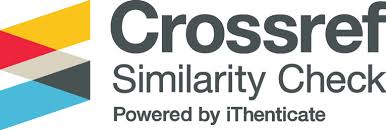Pengaruh Budaya Organisasi dan Self Eficacy Terhadap Komitmen Organisasional
Abstract
The purpose of this study was to determine how the influence of organizational culture and self-efficacy on organizational commitment either partially or simultaneously. This research was conducted at the Creative Economy Agency of Denpasar City. The number of samples taken was 60 respondents. Data collection techniques are observation, interviews, documentation, literature and questionnaires. While the data analysis techniques are validity, reliability, classic assumption test, multiple linear regression analysis, multiple correlation, t test (t test), determination, and f test (f test). The test results show that there is a positive and significant influence between organizational culture on organizational commitment. it can be seen from the results of the t-test that the t-test is 3,313, which is greater than the t-table of 1.671 and the sig value of 0.002 so that the first hypothesis is accepted. There is a positive and significant influence between self-efficacy on organizational commitment, seen from the results of the t-test, it is obtained that the t-count is 4.498, which is greater than the t-table of 1.671 and the sig value of 0.000, so the second hypothesis is accepted. There is a positive and significant influence between organizational culture and self-efficacy on organizational commitment seen from the F-count is 47.385 greater than the F-table of 3.15 so that the third hypothesis is accepted.
References
Bandura, 2017, Social Learning Theory.Prentice-Hall.
Baron, Robert, A., & Byrne. D. (2014). Psikologi Sosial jilid 2. Jakarta: Erlangga.
Chamariyah, 2015, Pengaruh Self Efficacy, Assertiveness, danSelf EsteemTerhadap Keinginan Pindah Kerja (Turnover intentions) Pegawai Pada Bank Jatim Cabang Pamekasan, Jurnal NeO-Bis, 9(1), 20-38.
Dewi (2017) dengan judul Pengaruh Budaya Organisasi Terhadap Komitmen Organisasional Dan Organizational Silence Pada PT. PLN (Persero) Rayon Denpasar. E-Jurnal Ekonomi dan Bisnis Universitas Udayana tahun 2017.
Gary Yukl. 2015. Kepemimpinan dalam Organisasi (Leadership in Organization) , (Edisi Ketujuh) . Jakarta. PT.Indeks
Griffin. 2015. Organizational Behavior: Managing People and Organizations. Eleventh Edition. USA: South. Western
Ghozali, imam. 2013. Aplikasi Analisis Multivariat dengan Program iBM SPSS. Edisi 7. Semarang: Penerbit Universitas Diponegoro.
Ivancevich, John M., et al., 2013. Organizational Behavior and Management. 10thEdition. New York: McGraw-Hill Education
Jones, G. R. (2011). Socialization tactics, self-efficacy, and newcomers adjustments to organizations. Academy of Management Journal Vol. 29.
Kotler, P., John, dan Heskett, L. James, (2013), Corporate Culture and Performance, New York : Maxwell MacMilian.
Lee, C. & Bobko, P. (2014). Content, cause, and consequences of job insecurity: A theory-based measure and substantive test. Academy of Management Journal, 32, 803- 829.
Luthans, (2016), Perilaku Organisasi. Edisi Sepuluh, PT. Andi: Yogyakarta
Mahayasa, I. G. A., Sintaasih, D. K., & Putra, M. S. (2018). Pengaruh kepuasan kerja dan budaya organisasi terhadap komitmen organisasional dan organizational citizenship behavior perawat. Matrik: Jurnal Manajemen, Strategi Bisnis Dan Kewirausahaan, 12(1), 71-86.
Mohammad, Luva, Rumana. H & Hossian, Saad M. 2012. impact of Organizational Culture on Employee Performance and Productivity: A Case Study of Telecommunication Sector in Bangladesh.
Newstrom, John W. 2011. Organizational Behavior: Human Behavior at Work. Newyork-America: McGraw-Hill Education.
Nurahma. 2019. Hubungan Budaya Organisasi Dengan Komitmen Organisasi Pada Tim Mataharikecil Bandung. Jurnal Spesia Vol 5 No 1 tahun 2019.
Phillips, J. M., & Gully, S. M. (1997). Role of goal orientation, ability, need for achievement, and locus of control in the self-efficacy and goal setting process. Journal of Applied Psychology, 82, 792–802.
Prinstvaninta. (2015). Pengaruh persepsi karyawan terhadap dukungan organisasi pada komitmen karyawan. Skripsi. Medan: Universitas Sumatera Utara
Robbins, Stephen P. (2011). Organizational behavior. Fourteenth Edition. Pearson education. New Jersey
Robbin & Judge. 2015. Perilaku Organisasi Edisi 16. Jakarta. Salemba Empat.
Sakina, N. (2014). Komitmen Organisasi Karyawan Pada PT. Bank “X” di Jakarta. Jurnal Psikologi Universitas Esa Unggul, Vol 7 No 2, , 81-90
Santoso, Slamet (2013). Stasistika Ekonomi plus Aplikasi SPSS,. Ponorogo : Umpo Press
Saputri (2020) dengan judulPengaruh SelfEfficacy, Kompensasi Finansial, Dan Kepuasan Kerja Terhadap Komitmen Organisasi (Studi Pada Petugas Billman Di PT. Cita Yasa Perdana Surabaya)
Sopiah. 2013. Prilaku Konsumen: Pendekatan Praktis. Disertai:Himpunan Jurnal Penelitian. Yogyakarta: Penerbit Andi.
Sugiyono. (2012). Memahami Penelitian Kualitatif”. Bandung : ALFABETA.
Sugiyono. (2014). Metode Penelitian Pendidikan Pendekatan Kuantitatif,. Kualitatif, dan R&D. Bandung: Alfabeta.
Sugiyono (2015). Metode Penelitian Kombinasi (Mix Methods). Bandung: Alfabeta
Wibowo . (2014) . Manajemen Kinerja. Edisi Keempat . Jakarta : Rajawali Pers
Yulan. 2017. Pengaruh Self-Efficacy, Budaya Organisasi Dan Motivasi Kerja Terhadap Komitmen Organisasi, DeReMa Jurnal Manajemen, Vol 12, No1.








